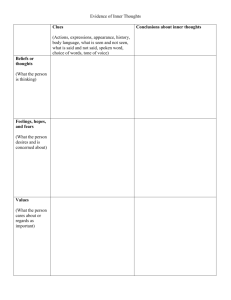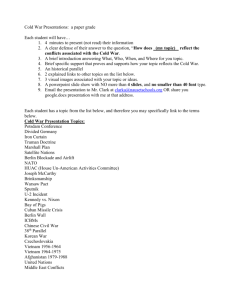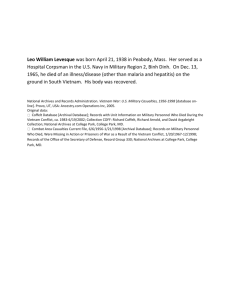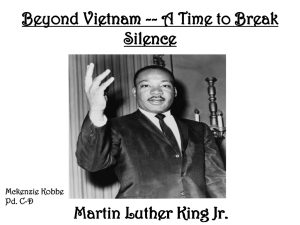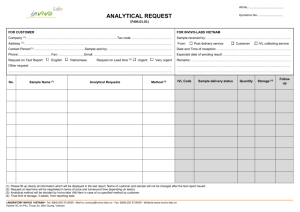Was Dr. Martin Luther King Jr. right to connect the struggle
advertisement
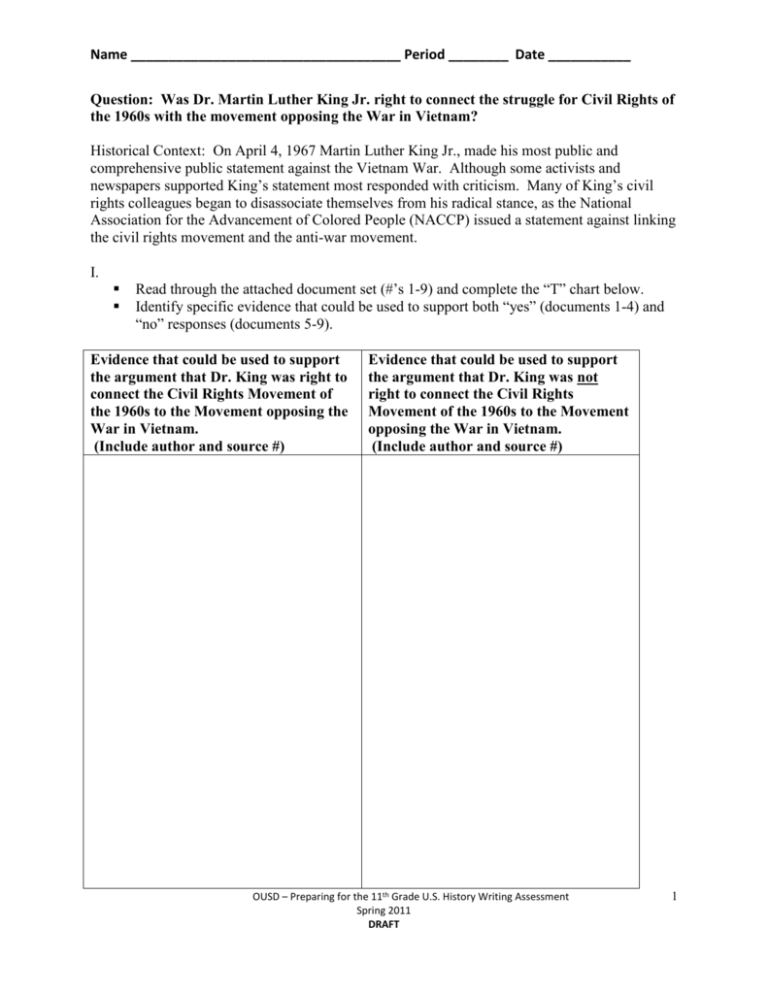
Name ____________________________________ Period ________ Date ___________ Question: Was Dr. Martin Luther King Jr. right to connect the struggle for Civil Rights of the 1960s with the movement opposing the War in Vietnam? Historical Context: On April 4, 1967 Martin Luther King Jr., made his most public and comprehensive public statement against the Vietnam War. Although some activists and newspapers supported King’s statement most responded with criticism. Many of King’s civil rights colleagues began to disassociate themselves from his radical stance, as the National Association for the Advancement of Colored People (NACCP) issued a statement against linking the civil rights movement and the anti-war movement. I. Read through the attached document set (#’s 1-9) and complete the “T” chart below. Identify specific evidence that could be used to support both “yes” (documents 1-4) and “no” responses (documents 5-9). Evidence that could be used to support the argument that Dr. King was right to connect the Civil Rights Movement of the 1960s to the Movement opposing the War in Vietnam. (Include author and source #) Evidence that could be used to support the argument that Dr. King was not right to connect the Civil Rights Movement of the 1960s to the Movement opposing the War in Vietnam. (Include author and source #) OUSD – Preparing for the 11th Grade U.S. History Writing Assessment Spring 2011 DRAFT 1 Name ____________________________________ Period ________ Date ___________ Counter-Arguments and Contrary Evidence: Was Dr. Martin Luther King Jr. right to connect the struggle for Civil Rights of the 1960s with the movement opposing the War in Vietnam? Directions: In the space provided below, write a paragraph making and supporting the argument that Dr. King was right to connect the struggle the civil rights to the movement opposing the War in Vietnam. Use at least 2 of the documents as evidence to support your argument. (Argument) Dr. King was right to connect the struggle for civil rights of the 1960s to the movement opposing the War in Vietnam because _______________________________ _ ________________________________________________________________________ (Evidence 1) For example: ________________________________________________________ ______________________________________________________________________________ ______________________________________________________________________________ ______________________________________________________________________________ (Analysis 1) This point supports King because __________________________________ ______________________________________________________________________________ ______________________________________________________________________________ ______________________________________________________________________________ (Evidence 2) For example: ________________________________________________________ ______________________________________________________________________________ ______________________________________________________________________________ ______________________________________________________________________________ (Analysis 2) This point also supports King because __________________________________ ______________________________________________________________________________ ______________________________________________________________________________ ______________________________________________________________________________ OUSD – Preparing for the 11th Grade U.S. History Writing Assessment Spring 2011 DRAFT 2 Name ____________________________________ Period ________ Date ___________ Part 2: Directions: Trade your paper with a neighbor and read their argument. Then write a COUNTER-ARGUMENT that tries to disprove or undermine their argument. A counter-argument should explain why their main ideas are incorrect, or why the evidence they used was not convincing. You can use the same documents or different ones to support your counter-argument. (Argument) Although many people believe Dr. King was right to connect the struggle for civil rights of the 1960s to in the movement against the War in Vietnam, others would argue has was wrong because__________________________________________________________________ ___________________________________________ (Evidence 1) For example: ________________________________________________________ ______________________________________________________________________________ ______________________________________________________________________________ ______________________________________________________________________________ (Analysis 1) This point suggests King was not correct because _______________________________ ________________________________________________________________________ ______________________________________________________________________________ ______________________________________________________________________________ (Evidence 2) For example: ________________________________________________________ ______________________________________________________________________________ ______________________________________________________________________________ ______________________________________________________________________________ (Analysis 2) This point also suggests King was not correct because ______________________________________________________________________________ ______________________________________________________________________________ ______________________________________________________________________________ OUSD – Preparing for the 11th Grade U.S. History Writing Assessment Spring 2011 DRAFT 3 Name ____________________________________ Period ________ Date ___________ Source Documents Documents 1-3 are from Dr. King's speech and lay out three reasons of his reasons for linking of the civil rights struggle to the movement against the war in Vietnam. Document # 1 There is a very obvious connection between the war in Vietnam and the struggle I, and others, have been waging in America. A few years ago there was a shining moment in that struggle. It seemed as if there was a real promise of hope for the poor -- both black and white -- through the poverty program. There were experiments, hopes, new beginnings. Then came the buildup in Vietnam and I watched the program broken and eviscerated [gutted]…, and I knew that America would never invest the necessary funds or energies in rehabilitation of its poor so long as adventures like Vietnam continued to draw men and skills and money like some demonic destructive suction tube. So I was increasingly compelled to see the war as an enemy of the poor and to attack it as such. - Martin Luther King Jr., from –speech at Riverside Church, New York City, April 4, 1967. Document #2 We [are] taking the black young men who had been crippled by our society and sending them eight thousand miles away to guarantee liberties in Southeast Asia which they had not found in southwest Georgia and East Harlem. So we have been repeatedly faced with the cruel irony of watching Negro and white boys on TV screens as they kill and die together for a nation that has been unable to seat them together in the same schools. So we watch them in brutal solidarity burning the huts of a poor village, but we realize that they would never live on the same block in Detroit. I could not be silent in the face of such cruel manipulation of the poor. - Martin Luther King Jr., from –speech at Riverside Church, New York City, April 4, 1967. Document #3 My third reason grows out of my experience in the ghettoes of the North over the last three years -- especially the last three summers. As I have walked among the desperate, rejected and angry young men I have told them that Molotov cocktails and rifles would not solve their problems…But they asked -- and rightly so -- what about Vietnam? They asked if our own nation wasn't using massive doses of violence to solve its problems, to bring about the changes it wanted. Their questions hit home, and I knew that I could never again raise my voice against the violence of the oppressed in the ghettos without having first spoken clearly to the greatest purveyor of violence in the world today -- my own government. - Martin Luther King Jr., from –speech at Riverside Church, New York City, April 4, 1967. Document #4: Dr. King provides a moral justification I have worked too long now, and too hard to get rid of segregation in public accommodations to turn back to the point of segregating my moral concern. Justice is indivisible. Injustice anywhere is a threat to justice everywhere. And wherever I see injustice, I'm going to take a stand against it whether it's in Mississippi or in Vietnam." - Martin Luther King, Jr. television interview, July 28, 1967 OUSD – Preparing for the 11th Grade U.S. History Writing Assessment Spring 2011 DRAFT 4 Name ____________________________________ Period ________ Date ___________ Source Documents 5 - 9 offer critiques of King's position. Document #5 - New York Times Editorial, April 7, 1967 Dr. King's Error In recent speeches and statements the Rev. Dr. Martin Luther King Jr. has linked his personal opposition to the war in Vietnam with the cause of Negro equality in the United States. The war, he argues, should be stopped not only because it is a futile war waged for the wrong ends but also because it is a barrier to social progress in this country and therefore prevents Negroes from achieving their just place in American life. This is a fusing of two public problems that are distinct and separate. By drawing them together, Dr. King has done a disservice to both. The moral issues in Vietnam are less clear-cut than he suggests; the political strategy of uniting the peace movement and the civil rights movement could very well be disastrous for both causes… The movement toward racial equality is now in the more advanced and more difficult stage of fulfilling basic rights by finding more jobs, changing patterns of housing and upgrading education. The battle grounds in this struggle are Chicago and Harlem and Watts. The Negroes on these fronts need all the leadership, dedication and moral inspiration that they can summon; and under these circumstances to divert the energies of the civil rights movement to the Vietnam issue is both wasteful and self-defeating… Dr. King makes too facile a connection between the speeding up of the war in Vietnam and the slowing down of the war against poverty...The nation could afford to make more funds available to combat poverty even while the war in Vietnam continues, but there is no certainly that the coming of peace would automatically lead to a sharp increase in funds. Document # 6: Dr. Ralph J. Bunche Criticizes King "It is not for me to offer advice to Dr. Martin Luther King. But as a citizen and as a Negro, I am entitled to comment upon the recent position and tactics of Dr. King… Like all of us, of course, he makes mistakes. Right now, I am convinced he is making a very serious tactical error which will do much harm to the civil rights struggle. I refer to the merging in his recent speeches of the civil rights movement and the crusade against the United States involvement in Vietnam …He should realize that his anti-U.S. in Vietnam crusade is bound to alienate many friends and supporters of the civil rights movement and greatly weaken it - an ironic twist for a civil rights leader - Dr. Ralph J. Bunche, United Nations Under Secretary of Political Affairs, from New York Times article, April 13, 1967 OUSD – Preparing for the 11th Grade U.S. History Writing Assessment Spring 2011 DRAFT 5 Name ____________________________________ Period ________ Date ___________ Document #7: The NAACP Criticizes King It is time to make a declaration, to make our position clear…Civil rights battles will have to be fought and won on their own merits, irrespective of the state of war or peace in the world. We are not a peace organization nor a foreign policy association. We are a civil rights organization. The N.A.A.C.P. remains committed to its primary goal of eliminating all forms of racial discrimination and achieving equal rights and equal opportunities for all Americans. We are, of course, for a just peace. But there already exist dedicated organizations whose No. 1 task is to work for peace just as our No. 1 job is to work for civil rights. - from New York Times, April 11, 1967, p. 1, 17. Document #8 - from letter to the editor [of the New York Times]: I consider that my support of the Urban League and membership in the N.A.A.C.P., to say nothing of my contributions to various liberal causes, entitle me to consider myself a white person of goodwill as the term is used by Dr. Martin Luther King in the Times of April 5 [1967]. Far from being willing personally to boycott the Vietnam War, however, or even have my son claim status of conscientious objector, I assert it is necessary to support the war in Vietnam. Dr. King’s simplistic assertion that our Government is the “greatest purveyor of violence in the world today” and his analogy between the use of weapons by our forces in Vietnam and the use of strange medicines and torture by Hitler’s murderers in the concentration camps of Nazi Germany raise grave doubts in my mind as to his ability to think clearly… JOSEPH LEWIS SIMON New York, April 5, 1967 Document #9: From letter to Dr. King April 2, 1967 Dear Dr. King: Your recent pronouncements which now go so far as to suggest the possibility of encouraging civil disobedience over Vietnam, cause me a great personal dilemma… I have pondered this deeply. I know [sic] that the civil rights movement relates closely to Vietnam. I know [sic] the national treasure being expended on Vietnam detracts from the civil rights programs. I know [sic] that a deprived negro family in an overcrowded tenement finds scarce comfort in the thought that his welfare may be subordinated to the progress of a war on the other side of the world. And yet I feel so strongly that this is one of the many times in U.S. history where domestic priorities must be temporarily re-arranged in order to secure the survival necessary to fight the domestic causes that I simply cannot support any agency which uses its power to oppose a foreign policy in which I deeply believe. I believe I am right and that is all there is to say. If we are not successful in our foreign policies, the grandchildren of the deprived tenement dwellers of today will not be members of tomorrow’s American middle classes. Respectfully yours, J. H. Cerf OUSD – Preparing for the 11th Grade U.S. History Writing Assessment Spring 2011 DRAFT 6 Name ____________________________________ Period ________ Date ___________ Concluding Assignment: Now that you have written paragraphs that both support and refute the argument that “Dr. Martin Luther King Jr. correct in linking the Civil Rights Movement of the 1960s to Movement Opposing the War in Vietnam,” examine your evidence and analysis. Select the response that you think is the strongest. Re-write your paragraph below and include a counterargument with a rebuttal. In 1967, Dr. Martin Luther King Jr. was (right or wrong) to connect the struggle for civil rights of the 1960s to the movement opposing the War in Vietnam because __________________________________________________ ______________________________________________________________________ . For example, ___________________________________________________________ ______________________________________________________________________________ ______________________________________________________________________________ ___________________________________________________________ This point suggests ______________ ________________________________________________________________________ _________________________________________________________________ Additionally,_____________________________________________________________ ________________________________________________________________________ _________________________________________________________________________ This point also suggests___________________________________________________ ______________________________________________________________________________ __________________________________________________________________ Some people may say that King was (correct or incorrect) because __________________ ________________________________________________________________________ However, this thinking is not correct because ___________________________________ ______________________________________________________________________________ __________________________________________________________________ Therefore King was (correct or incorrect) in linking the two movements. OUSD – Preparing for the 11th Grade U.S. History Writing Assessment Spring 2011 DRAFT 7



